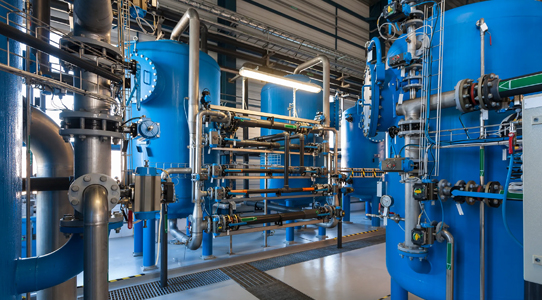Industrial Water treatment System
Industrial water treatment systems are designed to purify water for industrial applications, such as manufacturing, power generation, and chemical processing. These systems are typically more complex and larger than domestic water treatment systems due to the higher volume of water that needs to be treated and the variety of contaminants that may be present.
There are several types of industrial water treatment systems available, each designed to address specific water quality issues. Some common types of industrial water treatment systems include:
Reverse Osmosis (RO) Systems: RO systems are widely used in industrial applications to remove dissolved solids, minerals, and other contaminants from water. These systems are effective at removing contaminants that are smaller than water molecules, making them ideal for removing impurities such as salts, minerals, and heavy metals.
Ion Exchange Systems: Ion exchange systems use a resin bed to remove dissolved ions, such as calcium and magnesium, from the water. These systems are commonly used in water softening applications to prevent scaling and fouling in equipment.
Chemical Treatment Systems: Chemical treatment systems use chemicals such as chlorine, ozone, or hydrogen peroxide to disinfect water and remove contaminants. These systems are commonly used in applications such as cooling towers, where algae and bacteria growth can be a problem.
Ultrafiltration Systems: Ultrafiltration systems use a membrane to remove particles and impurities from the water. These systems are commonly used in industrial applications where high-quality water is required for processes such as electronics manufacturing.
Desalination Systems: Desalination systems use a variety of processes, including RO, to remove salts and minerals from seawater or brackish water. These systems are commonly used in coastal areas where fresh water is scarce.


When choosing an industrial water treatment system, it is important to consider the specific water quality issues that need to be addressed and to choose a system that is designed to meet those needs. It is also important to consider factors such as the capacity of the system, the level of maintenance required, and the cost of operation to ensure that the system is both effective and cost-efficient.
